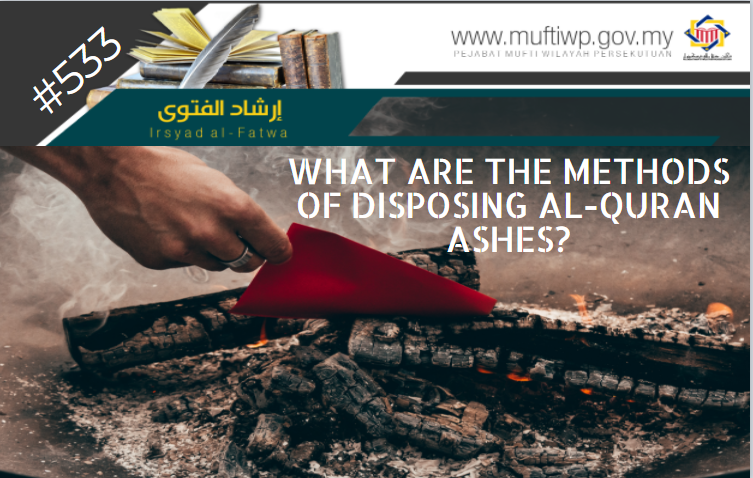Question:
Hope for explanation and suggestion on how to empty the ash storage of disposed al-Quran at the al-Quran disposal centre.
Brief Answer:
Al-Quran which is to be disposed should best being burnt in a clean place then the ashes are gathered and flowed to the sea or flowing river. Besides, the ashes may also be buried in an area which is remote from the people to avoid being stepped at. Its purpose is clear which is to preserve the honour and sanctity of al-Quran itself. Besides, we should preserve our ethics in handling the activity like always be in wudu’, not in impure state and etc.
Answer:
Preserving and honouring al-Quran is a responsibility and obligation upon all Muslims. Therefore, some methods are outlined by the scholars regarding the disposal of damaged al-Quran.
One of the methods suggested by the scholars is by burning it. This is based on what was done by Saidina Uthman bin ‘Affan RA during the process of collecting al-Quran that he ordered to gather all abrogated texts and burnt it to preserve the honour of al-Quran. This is as narrated by Anas bin Malik RA:
أن عثمان بن عفان رضي الله عنه :أَمَرَ زَيْدَ بْنَ ثَابِتٍ وَعَبْدَ اللَّهِ بْنَ الزُّبَيْرِ وَسَعِيدَ بْنَ الْعَاصِ وَعَبْدَ الرَّحْمَنِ بْنَ الْحَارِثِ بْنِ هِشَامٍ فَنَسَخُوهَا فِي الْمَصَاحِفِ وَقَالَ عُثْمَانُ لِلرَّهْطِ الْقُرَشِيِّينَ الثَّلاَثَةِ إِذَا اخْتَلَفْتُمْ أَنْتُمْ وَزَيْدُ بْنُ ثَابِتٍ فِي شَىْءٍ مِنَ الْقُرْآنِ فَاكْتُبُوهُ بِلِسَانِ قُرَيْشٍ فَإِنَّمَا نَزَلَ بِلِسَانِهِمْ فَفَعَلُوا حَتَّى إِذَا نَسَخُوا الصُّحُفَ فِي الْمَصَاحِفِ رَدَّ عُثْمَانُ الصُّحُفَ إِلَى حَفْصَةَ وَأَرْسَلَ إِلَى كُلِّ أُفُقٍ بِمُصْحَفٍ مِمَّا نَسَخُوا وَأَمَرَ بِمَا سِوَاهُ مِنَ الْقُرْآنِ فِي كُلِّ صَحِيفَةٍ أَوْ مُصْحَفٍ أَنْ يُحْرَقَ
`Uthman then ordered Zaid bin Thabit, `Abdullah bin AzZubair, Sa`id bin Al-As and `AbdurRahman bin Harith bin Hisham to rewrite the manuscripts in perfect copies. `Uthman said to the three Quraishi men, "In case you disagree with Zaid bin Thabit on any point in the Qur'an, then write it in the dialect of Quraish, the Qur'an was revealed in their tongue." They did so, and when they had written many copies, `Uthman returned the original manuscripts to Hafsa. `Uthman sent to every Muslim province one copy of what they had copied, and ordered that all the other Qur'anic materials, whether written in fragmentary manuscripts or whole copies, be burnt.
Sahih al-Bukhari (4987)
Imam Badr al-‘Aini in commenting on the above verse cited the opinion of Ibn Battal by stating:
فِي هَذَا الحَدِيث جَوَاز تحريق الْكتب الَّتِي فِيهَا اسْم الله، عز وَجل، بالنَّار وَإِن ذَلِك إكرام لَهَا وصون عَن وَطئهَا بالأقدام، وَقيل: هَذَا كَانَ فِي ذَلِك الْوَقْت، وَأما الْآن فالغسل إِذا دعت الْحَاجة إِلَى إِزَالَته
This hadith states that it is permissible to burn the texts which contain Allah SWT’s name by burning to honor and preserve it from being stepped at. In other opinion states: this opinion is applicable for that particular time while for now, washing it away is enough to erase the letters.
(Refer ‘Umdah al-Qari Syarh Sahih al-Bukhari, 20/19)
Imam Khatib al-Syirbini said that it is makruh to burn al-Quran without any purpose unless to preserve its honour.
وَيُكْرَهُ إحْرَاقُ خَشَبٍ نُقِشَ بِالْقُرْآنِ إلَّا إنْ قُصِدَ بِهِ صِيَانَةُ الْقُرْآنِ فَلَا يُكْرَهُ كَمَا يُؤْخَذُ مِنْ كَلَامِ ابْنِ عَبْدِ السَّلَامِ وَعَلَيْهِ يُحْمَلُ تَحْرِيقُ عُثْمَانَ - رَضِيَ اللَّهُ عَنْهُ –
And it is makruh to burn a wood carved with al-Quran except for the purpose of maintenance. So, it is not makruh as the opinion of Ibn Abd al-Salam based on the doing of ‘Uthman RA who burnt the book of al-Quran.
(Refer Mughni al-Muhtaj, 1/152)
Pertaining to the ashes, it is best to be gathered and placed in a safe place like being buried in a clean place and remote from people as to not being stepped at. Besides, it may also be flowed to the sea or flowing river. This is to maintain the honour and sanctity of al-Quran. Imam al-Zarkashi cited in his book that
وَفَى الْوَاقِعَاتِ مِنْ كُتُبِ الْحَنَفِيَّةِ أَنَّ الْمُصْحَفَ إذا بلي لا يحرق بل تحفر لَهُ فِي الْأَرْضِ وَيُدْفَنُ
What is mentioned in the writing of Hanafi madhhab that indeed, when it (al-Quran) is damaged. It is best to not burn it, but to be buried in the land.
(Refer al-Burhan fi ‘Ulum al-Quran, 1/477)
This is clear as decided by the 30th Conference of Islamic Legal Consultative Committee of National Fatwa convened on 22nd August 1992 which states that the method of burning is as the following:
- Materials containing verses of al-Quran should be burnt completely without leaving any parts of it thereof.
- Materials or ashes containing verses of al-Quran which are being burnt should be made sure to be gathered as for it to not being blown by the wind or left unentertained.
- Materials which are burnt should be buried at a clean place or a place remote from people or to the sea/river which water are flowing
- The burning should be regulated by the officer of Islamic Religious Council or any parties intending to dispose the materials.
CONCLUSION
Hence, it can be concluded that al-Quran which is to be disposed should best be burnt in a clean place then the ashes are gathered and flowed to the sea or flowing river. Besides, the ashes may also be buried in an area which is remote from the people to avoid it being stepped at. Its purpose is clear which is to preserve the honour and sanctity of al-Quran itself.
Besides, we should preserve our ethics in handling the activity like always be in wudu’, not in impure state and etc.


